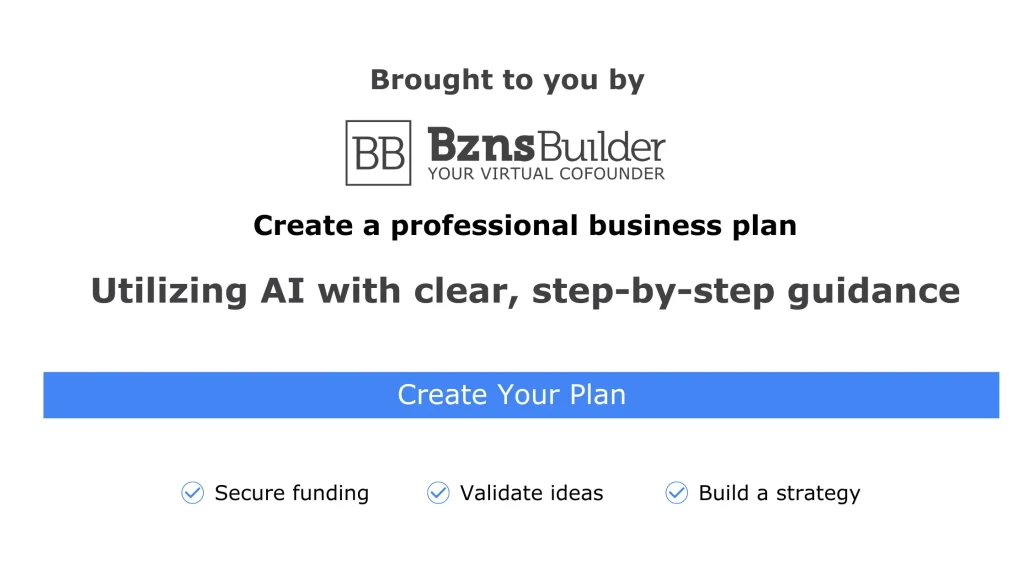14 Tips to Write Your Business Plan: A Guide for Small Businesses

Master the art of crafting an effective business plan with our expertly curated business planning tips and tricks. Explore a comprehensive business plan template designed by seasoned professionals with decades of experience in writing and reviewing successful small business plans.
Master the Art of Writing a Winning Business Plan
Creating a business plan is a crucial step in turning your entrepreneurial vision into reality. Whether you’re crafting a small business plan or a startup business plan, these tips will guide you through the process of writing an effective, compelling, and actionable business plan that stands out.
- Set the Foundation Before You Start
Diving headfirst into business plan writing without preparation can be overwhelming. Take a step back and clarify why you need a business plan. Whether it’s to secure funding, guide your growth strategy, or attract partners, understanding your purpose will save you time and effort. Start by organizing your thoughts on a single page to build a clear roadmap for your plan.
- Leverage Business Plan Templates for Success
Why start from scratch when there are incredible business plan templates available? Templates not only save you time but also ensure you include every critical element of a great plan. From outlining your vision to showcasing financial projections, using a proven structure can make writing your business plan much smoother.
- Know the Traits of an Effective Business Plan
What makes some business plans stand out while others fall flat? The key is in aligning your plan with your business needs, being realistic about your goals, and addressing potential challenges head-on. A truly great business plan isn’t just informative—it’s inspiring, actionable, and built on solid foundations.
- Make Your Message Irresistible
Your business plan isn’t just a document; it’s a pitch. To win over investors, lenders, or stakeholders, your plan must tell a compelling story. Think about what makes your business unique and how you can communicate your vision in a way that resonates. Engage your readers with clear language, strong visuals, and an exciting narrative that leaves them wanting to learn more. - Learn from Failed Business Plans
Many business plans fail to achieve their purpose because of common mistakes. From unrealistic projections to lack of clarity, understanding why plans fail will help you avoid these pitfalls. Effective business planning is about being proactive and addressing potential weaknesses before they become problems. - Avoid Common Business Planning Mistakes
The most successful entrepreneurs know that small errors can have big consequences. Skipping the planning phase, neglecting financial details, or failing to research your market can sink your idea before it gets off the ground. Take the time to avoid these mistakes and ensure your business plan is robust and reliable. - Put Effort into Formatting
Even the best ideas can get lost in a poorly formatted business plan. Dense paragraphs, inconsistent fonts, or lack of visuals can make your plan feel unapproachable. Instead, focus on creating a visually appealing document with clear headings, charts, and concise sections that guide the reader effortlessly. - Use Tools to Simplify Your Work
Don’t let business plan writing feel daunting. Take advantage of tools and resources designed to make the process easier. From online guides to financial modeling software, the right tools can help you write a business plan that’s professional and polished. - Accuracy is Key
A business plan is only as good as its accuracy. Investors and stakeholders need to trust your numbers and projections, so ensure your data is well-researched and realistic. Double-check everything from your market analysis to your financial forecasts to create a plan that inspires confidence. - Define Your Plan’s Purpose
Your business plan is a multi-functional tool, but it’s important to know its primary purpose. Are you using it to secure a loan, attract investors, or simply to strategize? While staying focused on your main goal, don’t overlook the many other ways your plan can guide your business in the long term.
- Bust Business Planning Myths
Think business plans are only for big companies or that they need to be lengthy? Think again. Busting common myths about business planning will free you from outdated ideas and allow you to focus on what truly matters: creating a plan that works for your business.
- Write Your Plan in Just One Day
Pressed for time? You can write a complete business plan in a single day with the right preparation. Start with a clear outline, use a reliable business plan template, and focus on keeping it simple. A one-day plan doesn’t mean it’s rushed—it’s about efficiency and clarity.
- Join the Global Planning Movement
Did you know there’s a month dedicated to business planning? Participating in ‘Write a Business Plan Month’ is one of the most exciting ways to embrace business planning tips in action. Connect with thousands of entrepreneurs, gather inspiration, stay motivated, and share your progress with a like-minded community as you develop a standout business plan.
- Consider Hiring a Business Plan Expert
Sometimes, working with a professional business plan writer can save you time and energy. However, not all writers are created equal. Be sure to ask the right questions and choose someone who understands your business vision to ensure you get a plan that’s as unique as your idea.








